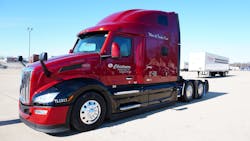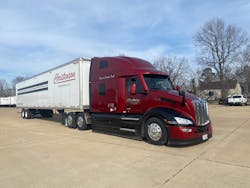For Don Christenson, the growth of Christenson Transportation Inc. is about much more than adding equipment and freight-carrying capacity.
“Trucking is a relationship business,” said the president of the family-owned business he founded in 1995. “Whether we’re interacting with our employees, working with customers, or partnering with suppliers, we look at how we’re interdependent for success.”
While his sights are set on growing his business by acquiring other trucking companies, Christenson is quick to note that he’s willing to pass on opportunities that only look good on paper. “We learned from our first acquisition in 2018 that it’s more important to find companies that fit with our culture,” he emphasized.
A recent case in point was Christenson’s acquisition of Sharp Transport Inc. While the purchase expanded the carrier’s freight network and added trucks, drivers, and owner-operators, it was shared goals that sealed the deal.
“What really drew us to Sharp Transport, which is a family-owned company that’s been around as long as ours, was its similar culture built around the drivers,” Christenson said. “It’s easy to quit a job, but it’s hard to quit on your friends and family, and Sharp Transport shared that same belief.”
See also: M&A experts forecast record deal volume in 2022
From its executive offices in Nashville, Christenson operates terminals in Springfield, Missouri, and in Lebanon and Ethridge, Tennessee. The company hauls high-value, high-risk, and time-sensitive freight across the lower 48 states. Its operations also include a dedicated fleet in Pennsylvania and a regional fleet that primarily covers the southeast.
Christenson operates 225 tractors and 900 dry vans. Peterbilt and Kenworth supply its power units; its trailer fleet is a mix of Utility, Great Dane, and Hyundai units. While the company continues to add new vehicles annually, it is looking to the future.Earlier this year, Christenson signed an eight-year agreement with Locomation to boost its capacity with autonomous trucking technology. For Christenson, Locomation’s turnkey solution will enable the fleet to deploy autonomous trucks in the near future, and Locomation’s proprietary planning and scheduling systems made them the right choice.
“We saw Locomation as an opportunity to establish a strong presence and enable us to double our market share in the lanes we’ve chosen,” Christenson explained. “Our goal is not to just add equipment but to offer existing customers additional capacity in the same freight lanes. With Locomation, we can restructure our operating model to run autonomous trucks more than 20 hours per day.”
By deploying 500 trucks equipped with Locomation’s Autonomous Relay Convoy (ARC) systems on five separate Autonomous Relay Network segments, Christenson is projecting an increase in capacity on those lanes of 52%, along with a 50% reduction in empty miles. The impact of increased loaded miles and reduced operating costs, including lower fuel expenses on those lanes, is expected to quadruple Christenson’s bottom line.
For all its operations, Christenson uses a combination of company drivers and leased owner-operators. “We’re dedicated to the importance of a strong driver culture, and we believe that has helped us address the challenge of finding and retaining drivers,” Christenson said. “We look for people who have the same dedication. For example, we may only hire 10 drivers from 500 applicants, but our annual turnover is down in the 40% range, which is a good number in this industry.”
The same quality over quantity approach is applied at Christenson to the carrier’s relationship with its maintenance providers. In addition to a company shop in Ethridge, the company outsources the bulk of its local work to its Peterbilt dealer, the Larson Group, and to MHC Kenworth. Over the road, it uses TravelCenters of America and other truck stop chains.
Behind the scenes, Christenson uses the Loadmaster TMS from McLeod Software for its asset and brokerage operations. The technology helps the carrier focus on things like booking only freight it has the capacity to handle efficiently.
McLeod IQ business intelligence software is used to develop real-time reports on select key performance indicators. Among its most valuable uses are for making effective fuel purchasing decisions, information it also shares with its leased owner-operators. The software provides safety data, including information from Lytx onboard cameras in Christenson tractors.
“As we move into a third generation of ownership,” Christenson stated, “our continuing commitment is to provide value to our customers.”
About the Author

Seth Skydel
Seth Skydel, a veteran industry editor, has more than four decades of experience in fleet management, trucking, and transportation and logistics publications. Today, in editorial and marketing roles, he writes about fleet, service, and transportation management, vehicle and information technology, and industry trends and issues.

